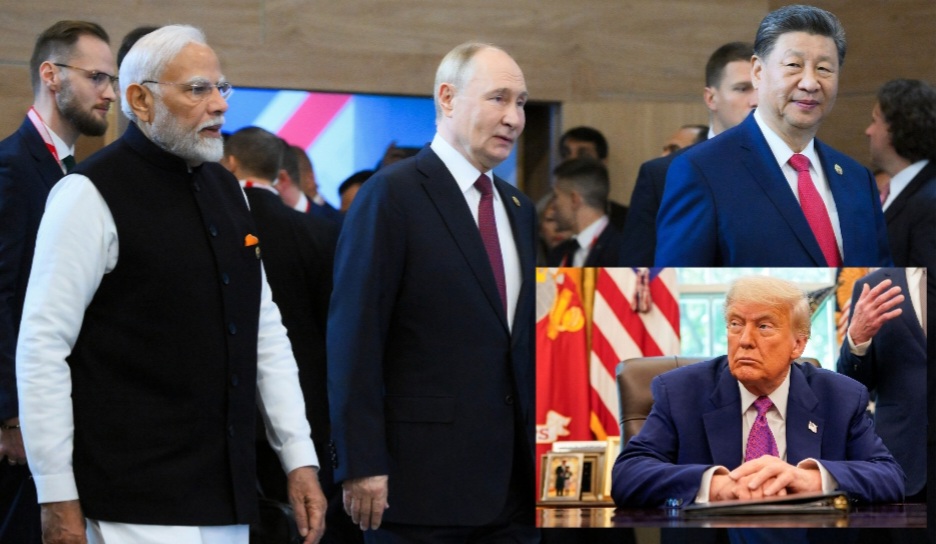The relationship between US and Russia is now fast deteriorating. Trump has been locked in a verbal skirmish with former Russian Prime Minister and close Putin aide, Dmitry Medvedev. With both Trump and Medvedev giving each other nuclear warnings. And now the US admin has come up with another blunt assessment.
The U.S. Ambassador to NATO under President Donald Trump, Matthew Whitaker has described Russian President Vladimir Putin as “sick, twisted and not logical,” adding that the United States will begin sanctioning countries that continue to maintain strong trade ties with Moscow. The remarks have escalated tensions with key global players, including India, China, and Brazil, who are now directly in the line of Washington’s economic pressure.
Speaking at a press briefing in Brussels earlier this week, the ambassador echoed Trump’s broader message that Putin is not a rational actor and must be isolated both militarily and economically.
“Putin is not logical. He is sick and twisted. We can’t reason with him like we would with a normal leader,” the ambassador said. “So we’ll go after the ones who are keeping his war machine alive — his trade partners. That includes India, China, and Brazil.”
Targeting Russia’s partners with sanctions and tariffs is the “obvious next step” in US efforts to mediate the Ukraine conflict, Whitaker, said.
US changes strategy to corner Russia
Whitaker also went on to elaborate how Trump os planning to corner Putin and force his hand. The US President Donald Trump has expressed frustration with delays in settlement efforts and threatened to place 100% tariffs and secondary sanctions on Russia’s trade partners if a deal is not reached by August 8.
“President Trump’s been clear that this war needs to end… And… is creating the environment that Russia will come to the table and negotiate a ceasefire,” Whitaker told Bloomberg TV on Monday.
“Secondary sanctions and tariffs against those that are paying for this war, like China, India, and Brazil, by buying the oil that Russia is producing, is an obvious next step to try to bring this war to an end.”
While Trump has acknowledged that new sanctions might prove ineffective, Whitaker said Washington sees targeting Russia’s oil trade as worth trying.
“I think this is going to really hit them where it counts, and that is in their main revenue source, which is the sale of oil to these countries,” he stated.
On Monday, Trump threatened New Delhi with new tariffs unless it halts Russian oil purchases. India has refused to take part in the sanctions on Russia, calling its energy trade a matter of national interest.
Moscow has faced waves of Western sanctions since the Ukraine conflict escalated in 2022. It has condemned them as illegal and counterproductive, adding that they have largely failed, as Russia redirected most of its trade to Asia, with China and India now its biggest energy buyers.
India, China and Brazil rally against the bullying
These remarks came shortly after NATO Secretary-General Mark Rutte warned that if Putin fails to engage in peace negotiations over Ukraine within 50 days, countries that continue doing business with Russia could face secondary sanctions and even 100% tariffs on their exports to the United States.
Rutte stated in a recent press conference, “We have reached a critical point. These nations have influence. If they choose to ignore the global cost of this war, they cannot expect a free pass. Sanctions are on the table.”
India responded sharply to the warnings. The Ministry of External Affairs issued a statement calling the threats “unacceptable” and criticized the West’s “double standards.”
“India has always conducted its foreign policy based on strategic autonomy. We do not take decisions based on threats or coercion,” said a spokesperson.
India has been purchasing discounted Russian crude oil and defense equipment since the war in Ukraine began, arguing that these transactions are in the national interest and do not breach any international law.
China also dismissed NATO’s rhetoric, calling it “economic coercion.” The Chinese Foreign Ministry emphasized that trade decisions are sovereign matters and warned that sanctions could destabilize already fragile global supply chains.
“China’s cooperation with Russia is lawful and legitimate. Unilateral sanctions will not solve the Ukraine crisis — dialogue and diplomacy will,” said a Chinese official during a press briefing.
Brazil too has now become frustrated with the continuous pressure with President Lula recently blaming US for coups in his country, while maintaining that he will not call Trump but instead will connect with Putin, Modi and Xi.
Geopolitical Fallout
Analysts say that Trump’s proposed policy of sanctioning Russia’s trading partners marks a serious escalation that could upend global trade dynamics.
According to Dr. Meera Rao, a senior fellow at the Global Policy Institute, “This is a dangerous gamble. Sanctioning major economies like India and China could trigger retaliation, spark trade wars, and split the international order even further.”
Others argue that the move may backfire by pushing these countries closer to Russia, consolidating an alternative economic bloc outside the U.S.-led system and reinvigorating BRICS. The signs indicate a diminishing old-world order and the emergence of a new multi polar world order, and the US is seemingly pushing the world towards it.








